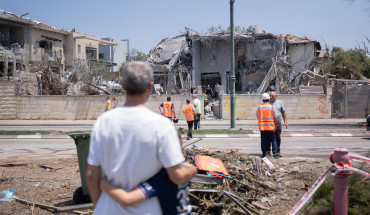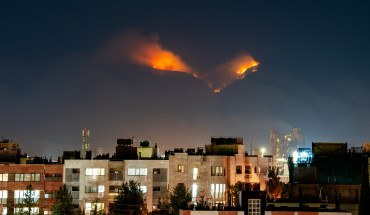This Commentary was originally published as an op-ed in The Nation June 10, 2009.
President Barack Obama's Cairo speech to the Muslims, around the world is unique in a number of ways. It departed from the world vision of his predecessor George W. Bush. Secondly, unlike the Bush administration, he extended a hand of friendship, towards the Muslim masses as well as leaders. Thirdly, it recognized the importance and respect that the Muslims and their religion deserve. Fourthly, President Obama, to the frown of the Israeli lobby and warmonger Senators and Representatives in Washington, D.C., took pains to address the plight of the Palestinians. He said, "And just as it devastates Palestinian families, the continuing humanitarian crisis in Gaza does not serve Israel's security; neither does the continuing lack of opportunity in the West Bank. Progress in the daily lives of the Palestinian people must be part of a road to peace, and Israel must take concrete steps to enable such progress." The President went on to say, emphatically: "So let there be no doubt: the situation for the Palestinian people is intolerable. America will not turn our backs on the legitimate Palestinian aspiration for dignity, opportunity, and a state of their own". These words were unheard during the previous administration. Twice in his tenure, Mr. Bush allowed and encouraged the Israelis to butcher hapless Palestinian women and children - once in Lebanon and then in the beached Gaza strip. To make matters worse he supported the growth of Israeli settlements in the Palestinian lands - giving more Israeli control over the lives of the residents, which in turn generated world wild resentment, hatred and militancy, amongst the Muslims.
Previously, for eight long years of the Bush Administration the American policy was dictated by hardliner neocons, who based their agenda on ideology and military might of the US. The support of Bush Administration came from the hard core Christian conservatives, who in their ideas and judgments resembled a lot with the Taliban and Al-Qaeda - the only difference being that of language and terminology. Bush administration got a lifelong chance to exert its ideology, when 9/11 happened. In the guise of "war against Islamic terrorism", it tried to revisit 17th-18th century style of colonialism in the Middle East and elsewhere, but could not succeed. A country like Iraq was invaded, without any valid reason and Iran remained under constant threat of attack.
During his presidential campaign, candidate Obama was charged with being a Muslim or an Arab. His hardliner opponents also condemned him as a sympathizer of the Muslims. All Obama did was to change the course from hate and tensions, generated by the neocons, to a realistic US global vision, which is to understand that US is no more a superpower, that can at will dictate its terms to other societies. Rather, the world is quickly moving towards multiple centers of economic and political power. For that a policy of understanding and accommodation is needed to serve the American interests and to address its security concerns. In order to dispel global perception of being a bully, the US president emphasized that his country "is not the crude stereotype of a self-interested empire." President Obama represents the real Americans, who are friendlier, liberal and accommodating, which was reflected in his address to the people of the Muslim societies. Earlier, he had declared in Turkey that "United States is not and will never be at war with Islam," and that he wishes to establish relations with the Muslim people on the basis of mutual respect and understanding.
The American president spent quite a bit of his address on issues of education and social welfare in the lacking Muslim societies. He promised to spend at least $1.5 billion each year for the next five years in Pakistan for that purpose. In spite of chest thumping, self praise and some boosting by the official circles, Pakistan's education structure is in a big mess and progressively it has slipped down in the companionship of the least literate societies. Because of the lack of imagination and planning, the prospects for the future are equally bleak. Higher education and research in public sector is nonexistent as a culture of greed and luxury has overtaken the educators of this vital stratum, and they have transformed themselves as petty bureaucrats, spending most of their time in useless and result less gatherings, while paying no attention to investigation and innovation. Professionalism has been dealt a severe blow, as short cuts, cheating of various kinds, plagiarism and sycophancy has taken a high seat. Incompetence has become the order of the day. One good aspect of the promised aid is that this time, even at the annoyance of the high ups, its dispensation will be monitored. In the past most of the assistance was consumed by corrupt bureaucrats and military generals, leaving very little for the people to benefit. But aid alone would not do, drastic steps are needed to pull up the dragged education sector.
Barack Hussein Obama reminded the Muslims of their contribution towards research and innovation. He convincingly said, "As a student of history, I also know civilization's debt to Islam. It was Islam - at places like Al-Azhar University - that carried the light of learning through so many centuries, paving the way for Europe's Renaissance and Enlightenment. It was innovation in Muslim communities that developed the order of algebra; our magnetic compass and tools of navigation; our mastery of pens and printing; our understanding of how disease spreads and how it can be healed. Islamic culture has given us majestic arches and soaring spires; timeless poetry and cherished music; elegant calligraphy and places of peaceful contemplation. And throughout history, Islam has demonstrated through words and deeds the possibilities of religious tolerance and racial equality".
In spite of all the nice words that Obama has to say about the Muslims, countries like Pakistan must realize that they have to build themselves and to rely on their own efforts. As well, these societies have to solve their conflicts and problems within themselves, utilizing their societal structures and strengths. The US assistance at this delicate juncture can be helpful but ultimate responsibility for the security and well-being of the Pakistanis depend solely on how serious and dedicated are the policy makers.
Assertions and opinions in this Commentary are solely those of the above-mentioned author(s) and do not necessarily reflect the views of the Middle East Institute, which expressly does not take positions on Middle East policy.
The Middle East Institute (MEI) is an independent, non-partisan, non-for-profit, educational organization. It does not engage in advocacy and its scholars’ opinions are their own. MEI welcomes financial donations, but retains sole editorial control over its work and its publications reflect only the authors’ views. For a listing of MEI donors, please click here.













